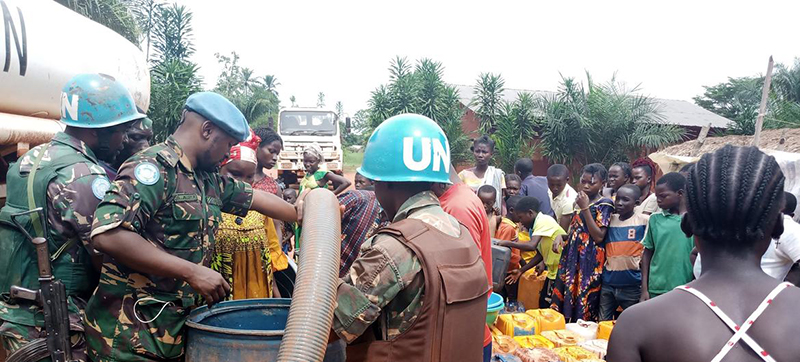 Atrocities
Atrocities
Preventing ‘contagion of atrocities’ hinges on responsibility to protect
For “countless civilians” caught in current conflicts around the world, taking responsibility for protecting them to prevent atrocities is more critical than ever, a senior UN official told the General Assembly on Monday.
“The lives of millions depend on that responsibility being given meaning,” Special Adviser on responsibility to protect (R2P) issues George Okoth-Obbo said, introducing the Secretary-General’s latest report and speaking on his behalf.
“This annual debate is a reminder to us not to drift from our commitment, our duty, our responsibility to protect.”
Preventing ‘contagion of mass atrocities’
Mr. Okoth-Obbo said the debate provides an opportunity to reflect on the cardinal political and moral commitment the world made 18 years ago to ensure that the “contagion of mass atrocities” would “never again” mark humanity.
At the 2005 World Summit, UN Member States had affirmed their responsibility to protect their own populations from genocide, war crimes, ethnic cleansing, and crimes against humanity.
In doing so, they agreed to support each other in realizing their roles under the R2P concept and to take collective action, in line with the UN Charter, where States were unable or unwilling to do so themselves.
“Yet, countless civilians continue to be caught in situations of conflict, violence, and egregious human rights violations which may amount to genocide, war crimes, crimes against humanity, and ethnic cleansing,” he said. "R2P thus remains as imperative today as when the world resounded 'never again' at the World Summit in 2005."
Development-protection nexus
In his report, the Secretary-General encourages Member States to invest in national capabilities and coordination mechanisms for early detection, early warning, prevention, and response to atrocities, and to develop improved systems for data collection and analysis to identify key risks that are embedded in social and economic patterns of deprivation or exclusion.
The report also explores a R2P’s intersection with development, Mr. Okoth-Obbo said.
“The keystone of R2P is, as has been underlined so many times, prevention,” he said. “At the same time, to craft and deliver solutions that are effective for this purpose, it is crucial that the root causes, risks, triggers, and multipliers of atrocity crimes are properly discerned.”
Drawing on the foundational objectives of the Sustainable Development Goals (SDGs), the report underlines that development can build the conditions for sustainable peace, equitable growth, and accountable governance, thereby cementing the prospects for realizing the fundamental R2P purposes and objectives.
Walking the walk
In the same vein, he said risk factors, drivers, and multipliers of atrocity crimes include underdevelopment, poverty, social inequality, conflict, food insecurity, stressors on social resilience, governance, institutional failure, lack of accountability, discrimination, and human rights abuses.
Most crucially, he said, the report calls particularly on States to comprehensively recognize, own, and politically champion the intersection between R2P and sustainable development.
It also calls on them to leverage related policies, strategies, and programmes across the whole spectrum of atrocity risk assessment.
He said he was looking forward to hearing plans of action from Member States, as they rise to the various challenges. He also underlined the importance of inclusion, including civil society, faith communities, traditional leaders, minority groups, and through media outreach.
“Let us today, in the context of the relationship between development and the responsibility to protect, catalyse every thought, idea, and way forward we could advance to help build a more prosperous world for all free from the risks or actualities of mass atrocities,” he said.
Support Our Journalism
We cannot do without you.. your contribution supports unbiased journalism
IBNS is not driven by any ism- not wokeism, not racism, not skewed secularism, not hyper right-wing or left liberal ideals, nor by any hardline religious beliefs or hyper nationalism. We want to serve you good old objective news, as they are. We do not judge or preach. We let people decide for themselves. We only try to present factual and well-sourced news.







